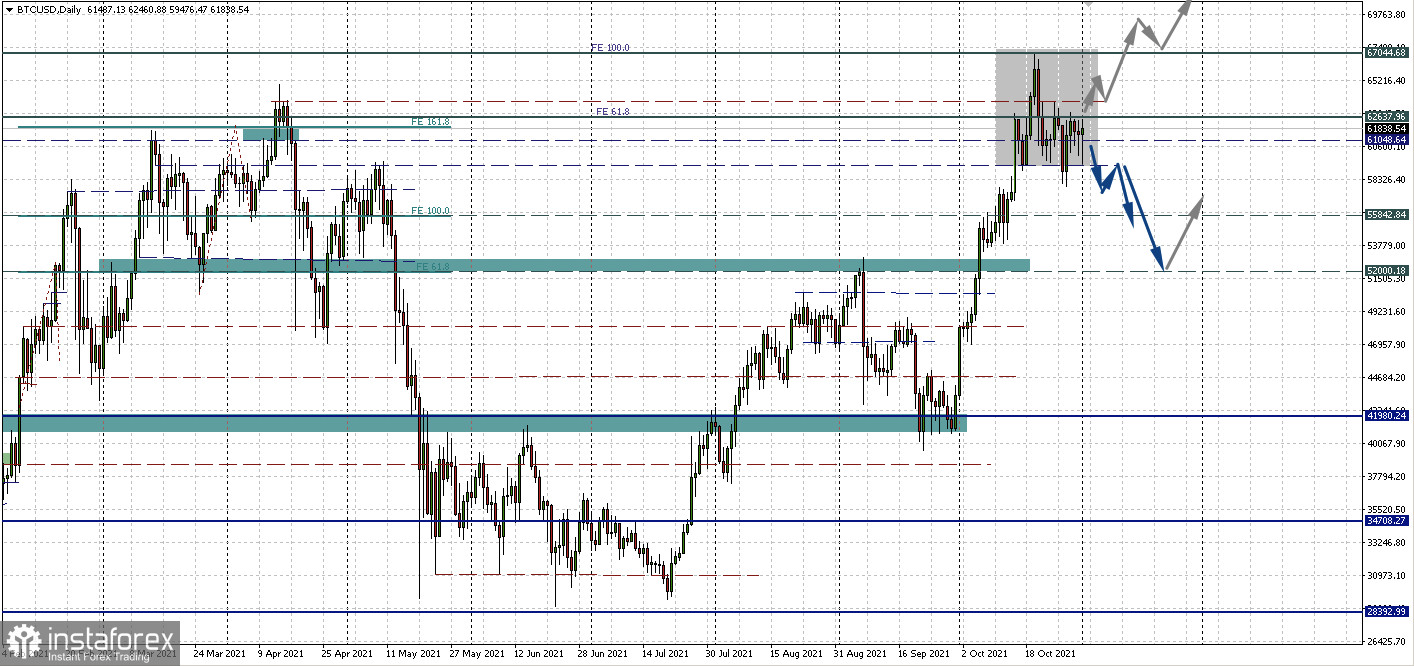Bitcoin's volatility has slowed after reaching an all-time high in October. The major cryptocurrency is now consolidating in a range between $59,000 and $62,500 per coin.
Consolidation is a sign of local uncertainty, a set of positions, and a harbinger of output to one side of that range. It is worth noting that the BTC/USD reversal scenario described earlier due to the formation of a head and shoulders pattern is still valid. Moreover, the consolidation in the 59,000 and 62,500 range is now just like a second-arm drawing.
Consequently, there is a high probability of a breakdown from the neckline, the support level 59383.67. An impulsive flat output downwards and a possible technical consolidation below the level would open the way for BTCUSD to move further down into the 55,000 area and below, $52,000 per coin.
A local slowdown in the market could be seen as a technical signal. But volatility is also slowing globally. It is a good sign.
According to Mike McGlone, a Bloomberg Intelligence commodity strategist, Bitcoin's price action, this year suggests that the digital coin might have moved past its usual history, especially the market's four-year crypto cycles. He attributed his claims to a natural maturation and the influx of institutional adoption, citing the US launch of the first Bitcoin futures exchange-traded funds last month.
Pantera Capital's CEO and founder Dan Morehead thinks that Bitcoin's extreme volatility could be a thing of the past. He has claimed that the four-year crypto price cycles that investors have grown accustomed to "are done." In addition, he says the market will see less volatility, on both the upside and downside.
Morehead thinks that deep bear markets like the one in 2018 that saw crypto assets shed over 90% of their value are a thing of our primordial past.
A hypothetical correction to the $52,000 or $55,000 per coin area is a local correction scenario. The market trend remains bullish. Billionaire venture capitalist Peter Thiel recently suggested that the high price of Bitcoin is indicative of inflation in the US.
Thiel is not alone in this opinion. JPMorgan previously attributed BTCUSD hitting an all-time high not to the launch of an ETF in the US, but to inflation fears.
According to Thiel, the US economy is facing real inflation, and the price rises currently being experienced are not transitory. Describing Bitcoin as "the canary in the coal mine," Thiel said, "It's the most honest market we have in the country, and it's telling us that this decrepit ... regime is just about to blow up."
Well, so far the Fed has not acted decisively to halt price rises. Meanwhile, personal consumption expenditures on Friday boosted the US dollar because of concerns about inflation.
Consequently, the major cryptocurrency still has a strong catalyst for growth, and in the medium term it can be expected that the upward movement of the BTCUSD pair will continue.






















